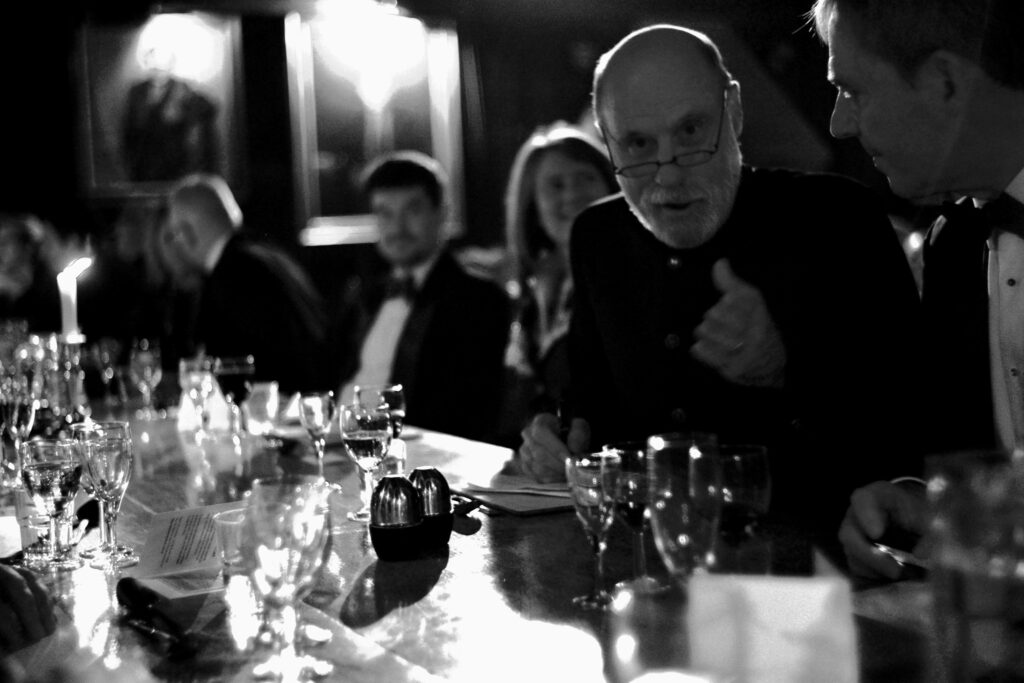Vint in full flow

Vint Cerf who, with Bob Kahn, led the project that designed the TCP/IP-based network we use today, sitting across from me at a dinner in Balliol a few years ago. He’s one of my heroes.
Quote of the Day
”Biography: voyeurism embellished with footnotes.”
- Robert Skidelsky (who wrote a fine biography of Keynes).
Musical alternative to the morning’s radio news
Ralph Vaughan Williams | Fantasia on Greensleeves
Link
Soothing bedtime music for genteel Brexiteers puzzled by why some things are missing from their supermarket’s shelves.
Long Read of the Day
Elite Education
By Jonny Thakkar, who teaches at Swarthmore, a posh American liberal arts school, whose ‘mission statement’ reads:
“Swarthmore College provides learners of diverse backgrounds a transformative liberal arts education grounded in rigorous intellectual inquiry and empowers all who share in our community to flourish and contribute to a better world.”
Thakkar’s essay critically examines this portentous declaration.
What is the meaning of the first “and” in that sentence? How exactly is the goal of providing a rigorous education supposed to relate to that of building a better world? Are they simply parallel, or is one supposed to be subordinate to the other? This isn’t about uncovering the founders’ original intent, since this particular sequence of words was only recently introduced. It’s more that the statement captures an uncertainty that runs deep at Swarthmore—and, I surmise, at similar institutions, however democratically governed they are. What is our role in the world? To what extent is our institution a vehicle for political progress as opposed to academic excellence?
Great long read, not entirely comforting for those of us who work in these so-called ‘elite’ outfits.
When power thrives on unspoken fear, bravery is in saying ‘I am afraid’
Really perceptive column by my Observer colleague, Nick Cohen.
There is a cosmetically appealing argument that going along with the lies of the powerful is better for the human spirit than acknowledging your cowardice. Writing in 1978, when communist control of eastern Europe appeared as if it might last forever, Václav Havel described a greengrocer who places the party’s slogan “workers of the world unite!” in his shop window. (You can put any gormless modern alternative in its place.) The greengrocer wants to show that he is an obedient citizen the police should leave alone. But he will not acknowledge the truth by pinning a notice in his window that says “I am afraid of being singled out for punishment”. The greengrocer would be embarrassed and ashamed to put such an unequivocal statement of his own degradation in the shop window. He preserves his dignity by pretending to believe what the powerful want him to believe. His sense of self-worth would be destroyed by the admission “I am afraid”.
Francis Fukuyama was so impressed with Havel’s passage he used it in The End of History to argue that the unfolding demand for human dignity was pushing humanity towards liberal democracy.
“The flaw in the argument”, says Cohen,
is that those who refuse to acknowledge their cowardice are not the only ones whose dignity is preserved. Surprisingly few of those who exercise power want their subordinates to admit that fear keeps them from speaking out. Maybe mafia leaders are happy to hear their followers say that they are too frightened to contradict them. But most people with hierarchical or ideological power are like abusive men who hit a woman one minute and expect her to act as if nothing happened the next. They want everyone around them to pretend that the fear of punishment does not explain their obedience.
Censorship is at its most effective when no one admits it exists.
Spot on. I had always read Havel’s essay the same (optimistic) way that Fukuyama did. I’ve changed my mind as a result of reading Nick.
How Ghent controlled the car
Really interesting ten-minute video. Left me wondering whether Cambridge (another picturesque, ancient, historic city) could do something like this.
Other, hopefully interesting, links
- Twitter thread on the Metaverse idea Link
- Josephine Baker becomes the first black women to be buried in the Pantheon Link
- Household surrealism by Helga Stentzel Wonderfully clever imagery. Link. (Via Kottke.org)
This blog is also available as a daily newsletter. If you think this might suit you better why not sign up? One email a day, Monday through Friday, delivered to your inbox at 7am UK time. It’s free, and there’s a one-button unsubscribe if you conclude that your inbox is full enough already!

